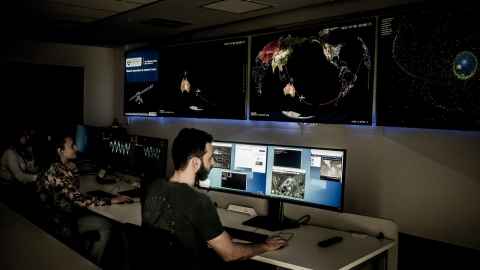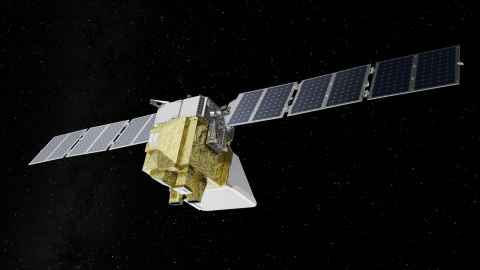University to operate methane tracking satellite
4 March 2024
The new mission control centre will provide hands-on experience to a new generation of space engineers and scientists.

New Zealand is poised to take an active role in the MethaneSAT space mission through the new mission control centre at Te Pūnaha Ātea-Space Institute at the University of Auckland.
The global methane tracking satellite, MethaneSAT, is scheduled to launch soon from the Vandenberg Space Force Base in California.
Designed to help combat climate change, the satellite uses state-of-the-art technology to detect methane emissions from oil, gas, agriculture and landfill.
Te Pūnaha Ātea-Space Institute will take over mission control operations of the spacecraft up to 12 months after launch.
Mission Operations Centre Lead at Te Pūnaha Ātea, Chris Jackson, says the University of Auckland is the first university in Aotearoa to operate a satellite, which gives students a great opportunity to kick-start their career in New Zealand’s growing space industry.
“Over the past few years, we've worked closely with partners within the space industry and research both in New Zealand and abroad to build the operations infrastructure, knowledge and experience required to operate spacecraft like MethaneSAT.
“With the upcoming launch, we're excited to move to the next phase of operating the spacecraft and to get students involved in the operations, so they are able to take their experience into the local space sector.”

The Mission Operations and Control Centre (MOCC) at the University will be responsible for the routine operations of the spacecraft, including payload operations, spacecraft health and safety, and collision avoidance.
The University has recruited experienced spacecraft operations staff for the MOCC and will introduce student involvement into the day-to-day operations.
This hands-on experience of operating a major space mission, coupled with courses such as aerospace engineering, provides a unique combination of practical and academic training to students looking to join the space sector.
The mission is led by MethaneSAT LLC, a non-profit subsidiary of the United States-based Environmental Defense Fund – a leading global environmental organisation based in the U.S.
It fills a critical gap in the capabilities of other satellites, both in orbit now and on the drawing board.
Other satellites can either identify methane emissions across large geographic areas or measure them at predetermined locations. MethaneSAT will do both. It will cover a wide, 200-kilometre view path with a high precision instrument that gives it greater detection capacity, passing over important target regions every few days.
A multi-institution, multi-disciplinary team of Aotearoa’s leading researchers in atmospheric science and remote sensing, led by Dr Sara Mikaloff-Fletcher of NIWA, will use the MethaneSAT satellite to demonstrate the potential to use satellites to accurately measure methane emissions from agriculture, both in New Zealand, and around the world.
Funding for the MOCC is administered by the Ministry for Business, Innovation and Employment (MBIE) on behalf of the Government.
Te Pūnaha Ātea-Space Institute is a multidisciplinary centre of expertise in space science and engineering at the University of Auckland. It aims to enhance the growth of the New Zealand space sector with world-leading applied research and development, as well as educational programmes that shape the next generation of scientists and engineers.
Institute academics and staff have deep expertise and decades of experience in delivering and operating successful space missions. The Institute has facilities to build, test and operate spacecraft that are available to the New Zealand space industry.
Media contact
Hussein Moses | Media adviser
M: 027 361 1000
E: hussein.moses@auckland.ac.nz